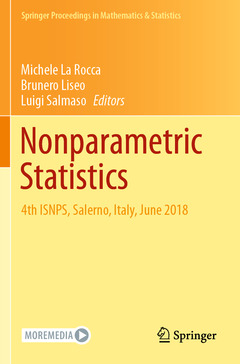Description
Nonparametric Statistics, 1st ed. 2020
4th ISNPS, Salerno, Italy, June 2018
Springer Proceedings in Mathematics & Statistics Series, Vol. 339
Language: English
Subjects for Nonparametric Statistics:
Keywords
nonparametric statistics; semiparametric statistics; dependent data; nonparametric curve estimation; permutation and resampling techniques; regression smoothing; time series; varying coefficient models; symmetry testing; rank-based methods for factorial design; ordinal data; spatial data; survival data; joint modeling of longitudinal and time-to-event data; nonparametric inference; nonparametric estimation
Publication date: 11-2021
547 p. · 15.5x23.5 cm · Paperback
Publication date: 11-2020
547 p. · 15.5x23.5 cm · Hardback
Description
/li>Contents
/li>Biography
/li>Comment
/li>
Highlighting the latest advances in nonparametric and semiparametric statistics, this book gathers selected peer-reviewed contributions presented at the 4th Conference of the International Society for Nonparametric Statistics (ISNPS), held in Salerno, Italy, on June 11-15, 2018. It covers theory, methodology, applications and computational aspects, addressing topics such as nonparametric curve estimation, regression smoothing, models for time series and more generally dependent data, varying coefficient models, symmetry testing, robust estimation, and rank-based methods for factorial design. It also discusses nonparametric and permutation solutions for several different types of data, including ordinal data, spatial data, survival data and the joint modeling of both longitudinal and time-to-event data, permutation and resampling techniques, and practical applications of nonparametric statistics.
The International Society for Nonparametric Statistics is a unique global organization, and its international conferences are intended to foster the exchange of ideas and the latest advances and trends among researchers from around the world and to develop and disseminate nonparametric statistics knowledge. The ISNPS 2018 conference in Salerno was organized with the support of the American Statistical Association, the Institute of Mathematical Statistics, the Bernoulli Society for Mathematical Statistics and Probability, the Journal of Nonparametric Statistics and the University of Salerno.
Michele La Rocca is a Full Professor of Statistics at the University of Salerno, Italy. He has published scientific papers on empirical likelihood, nonlinear time series and neural networks, resampling techniques, with applications to biological and financial data. He is an elected member of ISI and a former member of the Charting Committee of the International Society for Nonparametric Statistics.
Brunero Liseo has been a Full Professor of Statistics at the School of Economics, Sapienza University of Rome, Italy, since 2002. He has published more than 60 papers in international, peer-reviewed journals. His research interests include Bayesian inference, distribution theory, official statistics, and stochastic processes. He is the Director of the Ph.D. School of Economics, Sapienza, and a member of the Advisory Board of ISTAT, and of NADO Italia – the National Anti-Doping Organization, the Italian chapter of WADA.
Luigi Salmaso is a Full Professor of Statistics at the Department of Management and Engineering at the University of Padua, Italy. He is the author and creator of the NonParametric Combination Test software for multivariate and multistrata permutation tests. He has published more than 100 papers in international, peer-reviewed journals. His main research interests include nonparametric statistics, multivariate analysis, conjoint analysis, big data analytics, and biostatistics. He has received over 3000 citations and written a leading book on permutation testing. He is an Associate Editor for various international ISI journals.
Presents the latest advances in nonparametric and semiparametric statistics
Addresses theory, methodology, applications, and computational aspects
Includes contributions on nonparametric curve estimation and nonparametric and permutation solutions for several types of data




